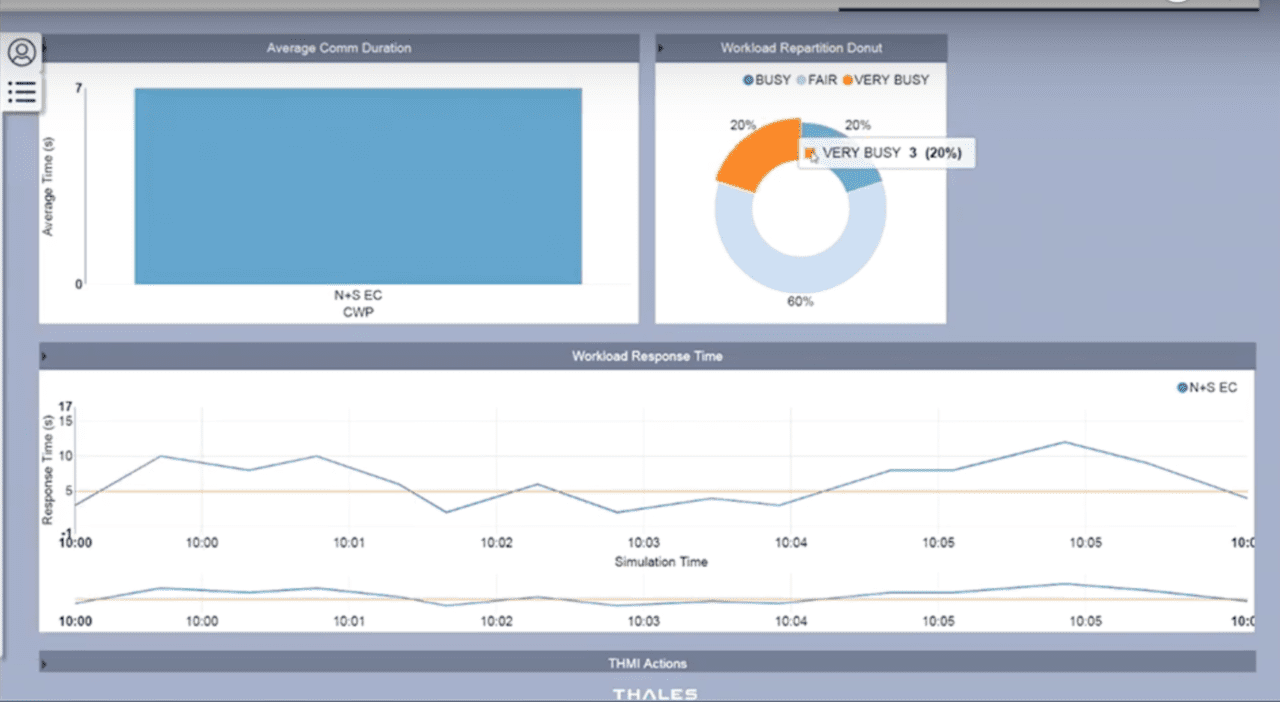
Tracking the performance of a controller trainee in Thales’ SkyCentre-SimDebrief. (Thales, AVI screenshot)
EUROCONTROL projects a 53 percent increase in European flights by 2040 and an 84 percent in global flights. To help deal with the increased air traffic — despite an ongoing staffing shortage and recruitment problems — Thales is using artificial intelligence to bolster the efficacy of each air traffic controller.
The French company’s SkyCentre-SimDebrief is aimed at helping to more efficiently and effectively train and support air traffic controllers, Jean-Phillipe Pinheiro said at a Thursday meeting in Montreal on the uses of artificial intelligence. Pinheiro is the manager of Thales’ SkyCentre ATM innovation lab and the company’s “human factor expert.”
“This is our solution to cope with the increase in training needs raised by this huge increase in traffic load that is coming,” Pinheiro said. “This is our answer to make the system as safe as today and to make sure you can still fly in a safe environment in 20 years time.”
SkyCentre-SimDebrief is a souped-up simulation program that better tracks the actions of trainee controllers than used to be possible. That has multiple benefits, according to Pinheiro. Think of it like a smartwatch.
“When you go running, you get the access to a lot of statistics about distances you’ve been running, you’re heart rate; Such easy access to the quantification is quite motivating because you can see the progress of your training,” Pinheiro said.
At the same time, the system allows more effective critiques because it catches errors that would previously have gone unnoticed. Instead of just an instructor watching a controller handling the mockup of aircraft separation, the system can now track eye movement and heart rate, keep specific logs of each input the trainee makes, document the duration and cadence of voice calls between the trainee and pilots to ensure they follow standards and keep recordings of the entire exercise for later playback, similar to studying game film.
The need for AI comes in, as it often does, because something needs to be done with all of that data that is now being collected. So the system can synthesize it into charts for the instructor to monitor in real-time and alert them if anything out of the ordinary is happening. Thales calls this “electronic instructor assistant.”
“If you were an instructor doing a simulation with your trainee, the electronic instructor assistant would be like another instructor sitting alongside you,” Pinheiro said. “It would be looking at a lot of data, detecting if something is going well, going bad, and touching you on the shoulder saying there is something happening at this position.”
Pinheiro’s team is working with Thales Australia and Thales Singapore to improve the AI component of the system. It uses machine learning based on digitized instructor grading and feedback to help it refine its standards so it can more effectively and precisely do its job in the future.
Thales isn’t looking to use artificial intelligence only in ATM applications. The company said it has spent nearly $8 billion on digital technologies such as AI since 2014, and according to Chief Executive Patrice Caine, the company sees a lot of potential uses.
For example, autonomous vehicles, such as Uber’s air taxi — Thales is building flight controls for Bell’s vehicle for that project — rely heavily on the advancement of AI. The French company is “involved in a certain number of demonstrators or proofs of concept” on that front, Caine said, though wouldn’t go into specifics as “most companies” don’t want to be named.
Mostly, Caine and his panel partner, neural network expert Yoshua Bengio, talked about the ethics of AI and societal implications. Thales will create its own charter for AI use, but Caine said he hopes that broader steps across industries or countries come.
“We will not succeed on our own,” he said. “We are totally convinced we will win with an ecosystem. We will progress with as many stakeholders as possible… Definitely, we will not work on our own.”
To that end, Caine’s panel also featured a video from the United Arab Emirates’ Omar bin Sultan Al Olama, the country’s first Minister of State for Artificial Intelligence, to echo his sentiment.
“Artificial Intelligence is a technology that is going to bring exponential change,” he said. “This technology is a technology that brings a lot of promise, but, if used in the wrong ways, brings a lot of peril as well… We hope that the discussion of AI can be one that involves every country.”
Caine and Bengia also discussed the state of AI as a technology and how long it will take before it reaches certain milestones.
“[There is] the problem of high-level condition vs. perception,” said Bengia, the head of the Montreal Institute for Learning Algorithms. “Currently, we’re doing very good at perception, and we’re starting to do well at action, but really not anywhere near even, like, your cat. So, the connection between action and perception needs to be improved and, also, the ability to understand language.
“Right now, we have systems that seem to do reasonably well until they fail, and then you realize that they really didn’t understand, they were doing their work in a very superficial way.”
Bengia said that moving machines from learning to efficiently complete tasks to the point where they properly understand tasks will probably take “many years, if not decades.” That isn’t to downplay what already exists, though. The ability of artificial intelligence to augment human efforts — as in what Thales is trying to do with air traffic management — is already tremendous, according to Bengia.
“There’s enough that we have found that can fuel an industrial revolution,” he said. “But more is coming.”